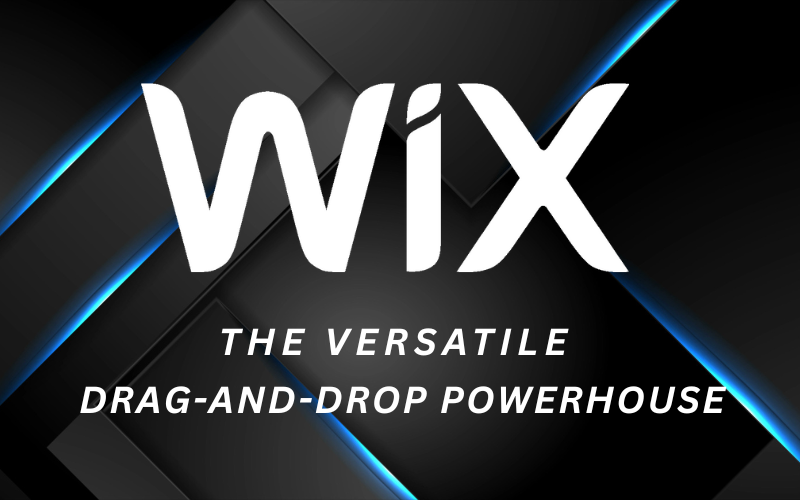Introduction
In today’s digital age, having a professional website is essential for businesses, entrepreneurs, freelancers, and creatives alike. Whether you want to showcase a portfolio, sell products online, or build a blog, a reliable and easy-to-use website builder can make the entire process smooth and efficient. Website builders are platforms that provide tools and templates, enabling users to create websites without needing extensive coding or technical skills. They offer drag-and-drop editors, hosting, SEO tools, and a variety of customizable options to tailor your site to your needs.
Looking for the best website builders ? Explore our expert comparison of the top platforms based on features, pricing, ease of use, and performance to find the perfect builder for your blog, business, or online store.
With countless website builders available, choosing the right one can be overwhelming. This article offers an in-depth review of the top five website builders that dominate the market today. We will examine their features, ease of use, pricing, and suitability for different user groups. By the end of this guide, you will have a clear understanding of which platform aligns best with your website goals and technical comfort.

Wix: The Versatile Drag-and-Drop Powerhouse
Overview and Features
Wix is renowned for its flexible drag-and-drop interface combined with a vast selection of templates spanning numerous industries and niches. It allows users to create highly customized websites without touching any code. Wix offers a rich app marketplace that lets you add functionalities such as live chat, booking systems, email marketing, and online stores. The platform supports both simple brochure sites and complex e-commerce ventures.
Additionally, Wix offers ADI (Artificial Design Intelligence) technology that can automatically generate a personalized website based on your answers to a few questions. Wix also provides built-in SEO tools, mobile optimization, and secure hosting, ensuring your site performs well in search results and on all devices.
Specifications
Wix websites include SSL encryption, scalable hosting on global servers, and support for custom domains. Its editor supports multimedia content, animations, video backgrounds, and flexible page layouts. Users can add blogs, forums, and online stores with multiple payment options.
Pricing
Wix has a free plan that includes Wix branding and limited features. Premium plans vary from affordable personal use packages to more expensive business and e-commerce plans, offering custom domains, increased storage, removal of Wix ads, and priority support.
Pros and Cons
Wix excels in creative freedom and feature diversity. Its intuitive editor suits both beginners and experienced users. However, once a template is chosen, switching to another template requires rebuilding the site. Some users find that advanced customization may require a learning curve.
Who Is It For?
Wix is ideal for small business owners, artists, bloggers, and anyone who wants a visually impressive, feature-rich website with extensive customization options.
Why Choose Wix?
The combination of drag-and-drop flexibility, a large app market, and AI-assisted design tools make Wix a compelling choice for users who want control without complexity.
Final Thought on Wix
Wix remains a leading website builder for users seeking versatility and creative control, making it suitable for almost any type of website project.
Squarespace: Elegant Designs with Powerful Features
Overview and Features
Squarespace is famous for its beautifully designed templates that prioritize aesthetics and user experience. It is a favorite among creatives such as photographers, designers, and artists who want a visually stunning online portfolio or store. Squarespace offers integrated blogging tools, e-commerce capabilities, and built-in marketing features such as email campaigns and social media integrations.
Squarespace’s editor provides a structured approach to design, focusing on consistency and style across pages. The platform automatically optimizes sites for mobile devices and search engines.
Specifications
Squarespace sites come with SSL certificates, fast and reliable hosting, and built-in analytics. The platform supports unlimited bandwidth and storage on most plans and offers seamless integration with payment gateways including Stripe and PayPal.
Pricing
Squarespace does not offer a free plan but provides a 14-day free trial. Paid plans start at mid-range monthly fees for personal use and scale up to advanced e-commerce plans with inventory management and advanced analytics.
Pros and Cons
Squarespace’s strengths lie in its polished templates and ease of use for design-focused users. Its integrated tools reduce the need for third-party apps. On the downside, it offers less freedom in layout customization compared to drag-and-drop builders and lacks a free plan.
Who Is It For?
Squarespace is perfect for creatives, small businesses, and entrepreneurs who prioritize design aesthetics and integrated marketing tools.
Why Choose Squarespace?
Its sophisticated templates and all-in-one platform simplify website creation for users wanting an elegant and professional online presence.
Final Thought on Squarespace
Squarespace is a top choice for users who value design excellence and integrated features in a user-friendly environment, albeit with some trade-offs in customization flexibility.
Weebly: User-Friendly and Cost-Effective Website Building
Overview and Features
Weebly offers a straightforward drag-and-drop website builder that focuses on ease of use and affordability. It includes essential features for building blogs, portfolios, and small online stores. Weebly’s platform integrates with Square’s payment system, making it an excellent choice for users interested in e-commerce.
The builder supports custom domains, SSL security, SEO settings, and a variety of apps to enhance website capabilities. Weebly also provides mobile apps for managing your website on the go.
Specifications
Websites built with Weebly come with secure hosting, responsive designs, and access to an app center with tools ranging from marketing to social integrations.
Pricing
Weebly offers a free plan with Weebly branding and limited features. Paid plans are competitively priced and include custom domains, enhanced e-commerce capabilities, and removal of ads.
Pros and Cons
Weebly’s main advantage is its simplicity, making it ideal for users new to website building. However, it lacks some of the advanced design and customization features of Wix or Squarespace, and some templates feel dated.
Who Is It For?
Weebly suits individuals and small businesses looking for an easy, affordable website builder without the need for advanced customization.
Why Choose Weebly?
Its simplicity, tight integration with Square payments, and mobile management tools make Weebly attractive to beginners and small shop owners.
Final Thought on Weebly
Weebly provides a no-fuss, budget-friendly website building experience that meets basic to moderate needs but may not satisfy power users.

WordPress.com: Flexible Blogging and Website Platform
Overview and Features
WordPress.com offers a hosted version of the world’s most popular content management system. It is ideal for bloggers, content creators, and businesses wanting a highly scalable and customizable website. While WordPress has a steeper learning curve than drag-and-drop builders, its extensive plugin ecosystem and themes offer unparalleled flexibility.
WordPress.com includes built-in SEO, social sharing, and e-commerce features. Users can start with simple blogs and expand to complex sites with multiple contributors and custom code.
Specifications
WordPress.com provides automatic backups, SSL security, and scalable hosting on fast servers. It supports custom domains and access to thousands of themes and plugins, allowing users to extend their site’s functionality.
Pricing
WordPress.com has a free basic plan with WordPress branding. Paid plans range from personal blogging to business and e-commerce tiers, unlocking premium themes, advanced design tools, and plugin installations.
Pros and Cons
WordPress.com excels in content management and customization potential. However, it requires more technical knowledge than typical drag-and-drop builders, and the free plan includes ads and branding.
Who Is It For?
WordPress.com is perfect for bloggers, professional content creators, and businesses needing a flexible platform with growth potential.
Why Choose WordPress.com?
Its open architecture and vast community support provide an unmatched foundation for custom websites, blogs, and online stores.
Final Thought on WordPress.com
While it requires a learning curve, WordPress.com is a powerhouse platform for users who want long-term flexibility and control over their website.

Shopify: Leading E-commerce Website Builder
Overview and Features
Shopify is a dedicated e-commerce platform designed to help users build online stores quickly and efficiently. It offers a range of customizable templates focused on product showcasing and sales optimization. Shopify provides inventory management, multiple payment gateways, shipping integrations, and marketing tools.
Shopify’s backend is user-friendly, allowing store owners to manage products, track orders, and analyze sales data seamlessly. The platform supports multi-channel selling through social media, online marketplaces, and point-of-sale systems.
Specifications
Shopify includes PCI-compliant hosting, SSL certificates, fraud analysis, and 24/7 customer support. Its platform is scalable to support businesses from startups to enterprise levels.
Pricing
Shopify does not offer a free plan but provides a trial period. Plans start at mid-tier monthly fees with options for advanced features, higher transaction limits, and professional reporting.
Pros and Cons
Shopify’s strength is its focused e-commerce tools and ease of managing online sales. However, it is less suitable for non-ecommerce websites and may become expensive with additional apps and payment fees.
Who Is It For?
Shopify is ideal for entrepreneurs and businesses wanting to launch or grow online stores without technical hassles.
Why Choose Shopify?
Shopify’s comprehensive e-commerce features and reliability make it the go-to platform for online retail success.
Final Thought on Shopify
For serious online sellers, Shopify offers unmatched tools, scalability, and support, though it comes with a focused scope and price considerations.
Check The full Review Of SHOPIFY CLICK HERE
Overall Conclusion
Choosing the best website builder depends on your project type, technical skill level, budget, and customization needs. Wix leads in flexibility and creative freedom. Squarespace stands out for design elegance and integrated marketing. Weebly offers simplicity and affordability. WordPress.com provides unparalleled customization and content management. Shopify dominates e-commerce with specialized tools.
By understanding the strengths and limitations of each platform, you can select the builder that will help you launch a professional, beautiful, and functional website tailored to your goals. In today’s digital marketplace, having the right website builder is key to making your online presence stand out and succeed.
Frequently Asked Questions (FAQs)
What is a website builder, and why should I use one?
A website builder is a tool or platform that helps users create websites without needing coding skills. It simplifies the design, hosting, and content management processes, enabling faster and easier website creation.
Can I switch website builders later if I’m not happy?
Switching is possible but can be complex depending on how your site was built. Some builders allow easy export of content, while others have proprietary systems making migration difficult.
Are website builders suitable for e-commerce?
Many website builders offer e-commerce features, but specialized platforms like Shopify provide more comprehensive tools for online stores.
Do website builders include hosting and domain services?
Most website builders provide hosting and allow you to register custom domains, simplifying site management in one place.
Can I customize my website’s design fully?
Customization varies by platform. Drag-and-drop builders offer high design flexibility, while template-based builders may restrict layout changes.
Are websites built with website builders SEO-friendly?
Yes, reputable builders include SEO tools and best practices, though optimizing your content remains your responsibility.
Is there a free website builder available?
Several platforms offer free plans with limitations such as branding or limited features. Paid plans provide more professional options.
Can I add third-party apps or plugins?
Many website builders support app marketplaces or plugin integrations to extend functionality, though options vary by platform.
How much does a website builder typically cost?
Pricing ranges from free plans to monthly fees between $5 and $40, depending on features, e-commerce needs, and support levels.
Do website builders provide customer support?
Most leading website builders offer customer support via chat, email, or phone, with premium plans often getting priority assistance.

